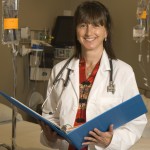This summer, students of Emory’s Nell Hodgson Woodruff School of Nursing’s  accelerated BSN (ABSN) program are embarking on a two-week immersion experience at five sites around the world—the City of Refuge in Atlanta, Moultrie, Ga., West Virginia, the Bahamas and the Dominican Republic. From June 12 to 24, ABSN students will work with local health care providers and community partners to provide health care, community assessments, program evaluations and a sustainability project in each location. Though service learning has long been a pillar of Emory’s School of Nursing, this is the first time the nursing school has offered an immersion experience of this magnitude.
At the City of Refuge in Atlanta, students are working in the HEALing Community Center, a community clinic that provides health care and various resources to Atlanta’s homeless population. During their time at the City of Refuge, nursing students are focusing on the maternal-child homeless population and interacting with more than 500 patients and residents of Eden Village at the City of Refuge, which also serves as transitional housing for mothers and their children. The HEALing Community Center provides primary care and outpatient surgery to patients who might not otherwise have access to medical care.
Just four hours from Atlanta in Moultrie, Ga., another team of nursing students is spending two weeks caring for farm workers and their families. The Migrant Farm Worker Family Health Program has allowed Emory nursing students to provide critical nursing care to more than 15,000 people. The nursing students will examine children by day and set up mobile clinics to treat adult farm workers in the evening, while evaluating the impact the program has had on the community since its inception in 1994.
For the first time, nursing students and faculty will be traveling to West Virginia to partner with Cabin Creek Health System. Students will evaluate how well the health system’s Medicaid disabled population’s mental health needs are being met. They will see patients in clinics and in their homes, asking them about their mental health needs and issues that drive patients to use other sources of care such as emergency departments and urgent care centers.
In the Bahamas, nursing students are stationed on the small island of Eleuthera to further develop partnerships with community organizations, educational institutions and The Bahamian Ministry of Health. Emory students are evaluating what Bahamian communities view as priorities for their health and then assessing what strengths and areas of growth exist. Nurses from Emory are working with local nurses to provide primary care to clinic patients and conduct health education seminars for primary and secondary school students.
In the Dominican Republic, Emory is partnering with two programs in Hospital San Vincente de Paul’s in San Francisco de Macoris. Students will evaluate the volunteer doula program and update the data collection tool of the Kangaroo Mother Care project, a method of caring for premature infants that involves constant skin to skin contact in place of an incubator. Infants who might otherwise spend their first days or weeks in an incubator are now with their mothers 24/7. Additionally students will visit hospitals at the provincial periphery and observe the workings of the referral system within the public health infrastructure.
Teaching students more than just clinical care, service learning trips offer nursing students the opportunity to develop respect for unfamiliar cultures while facing real-world health care challenges such as working with interpreters and facing medical supply shortages.
“We often hear that opportunities like this take both our students and faculty back to the start of why they wanted to become nurses,†says Corrine Abraham, RN, MN, a nursing instructor and the International Academic and Cultural Exchange Coordinator at Nell Hodgson Woodruff School of Nursing.“They not only enhance their clinical capabilities, but they also sharpen their caring skills, which are the heart our field.â€
Follow Emory’s School of Nursing students in the field.










